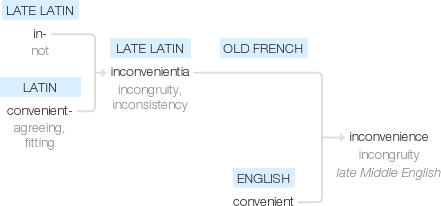Inconvenience
late Middle English (originally in the sense ‘incongruity’, also ‘unsuitability’): via Old French from late Latin inconvenientia ‘incongruity, inconsistency’, from in- ‘not’ + Latin convenient- ‘agreeing, fitting’ (see convenient).
wiktionary
From Middle English inconvenience, from Old French inconvenience(“misfortune, calamity, impropriety”) (compare French inconvenance(“impropriety”) and inconvénient(“inconvenience”)), from Late Latin inconvenientia(“inconsistency, incongruity”).
etymonline
inconvenience (n.)
c. 1400, "harm, damage; danger; misfortune, affliction," from Old French inconvenience "misfortune, calamity; impropriety" (Modern French inconvenance), from Late Latin inconvenientia "lack of consistency, incongruity" (in Medieval Latin "misfortune, affliction"), abstract noun from inconvenientem (see inconvenient). Sense of "impropriety, unfitness; an improper act or utterance" in English is from early 15c. Meaning "quality of being inconvenient" is from 1650s.
inconvenience (v.)
"to give trouble, impede, or hamper" (someone), 1650s, from inconvenience (n.). Related: Inconvenienced; inconveniencing.
The early Spanish missionaries in America were inconvenienced by finding that the only native word they could use for God also meant devil. [Herbert Spencer, "The Principles of Sociology," 1877]
